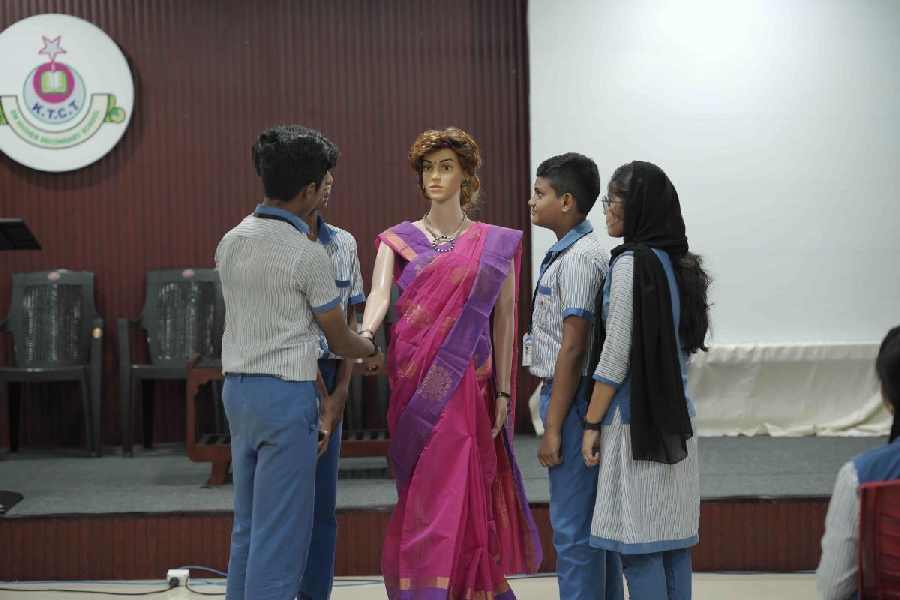She is equally at home describing the biology of an elephant and fielding tricky maths or history questions — in three languages. You'd be right to suspect she isn't quite human.
The sari-clad teacher at a Kerala school who has over the past few weeks been wowing its 3,000-odd students by answering all the questions they can think of is an AI-enabled humanoid robot.
Capable of moving around in a classroom, the AI teacher became operational at the KTCT Higher Secondary School in Thiruvananthapuram on February 5.
“One immediate result we can see is an increase in the level of curiosity among the students, who go well prepared to ask all kinds of questions and get enthralled by the ready answers,” M.N. Meera, principal (high school) at KTCT, told The Telegraph.
Developed by the Kochi-based start-up, MakerLabs, the AI teacher is driven by the company’s Intelligent Robotics Innovative System, after which it has been named as Iris.
Shyam Babu of MakerLabs, who developed Iris along with his colleagues Amal V. Nath and Hari Sagar, told this newspaper on Friday that it was “one of a kind in the world as a humanoid AI teacher”.
While AI-enabled teaching systems are usually just software installed in a laptop or tablet, what makes Iris stand out is its humanoid features, Babu said.
“Iris is pre-programmed to handle any subject taught from kindergarten to Class XII. It can respond to a ‘shake hand’ instruction, turn its head, move and even sense human presence from seven feet,” he said.
Although it is English-enabled by default, Iris is programmed to handle questions in Malayalam and Hindi, too. The company is working on increasing the number of languages to 20-plus. These will be mostly Indian languages.
Meera said students from kindergarten to Class X were regularly spending time with Iris as part of the school’s initiative to expose them to AI and its possibilities.
“We encourage students to ask questions on any subject taught in their class,” she said.
The unaided school, run by the Kaduvayil Thangal Charitable Trust, is a beneficiary of the centrally sponsored Atal Tinkering Labs (ATLabs) and has a well-equipped AI lab. It exposes its pupils to robotics, AI and 3D printing.
Since these are not topics that the regular teachers can handle, the school has entered into a tie-up with HowNWhy, a sister concern of MakerLabs, which sends techies over to teach the children.
“It is this interaction with HowNWhy and MakerLabs that prompted us to think about using an AI-enabled teaching system,” the principal said.
Iris runs on generative AI, used by applications such as ChatGPT, and its knowledge is therefore not as limited as that of certain automated teaching aids.
However, information on topics unsuitable for the pupils — such as sex, drugs and violence — are blocked.
Iris has several attributes of a human teacher and speaks in a female voice but lacks emotional attachment or the ability to identify the students.
“But if you say ‘I am feeling sad’, Iris will open its arms as if to hug you. Later versions can add facial features to make her smile,” Babu said.
Iris represents a base model for an AI-enabled hospital assistant that MakerLabs is developing, Babu said.
MakerLabs has received enquiries from several schools in Kerala, Andhra Pradesh and Tamil Nadu, and is trying to build upgraded models of Iris, Babu said.











